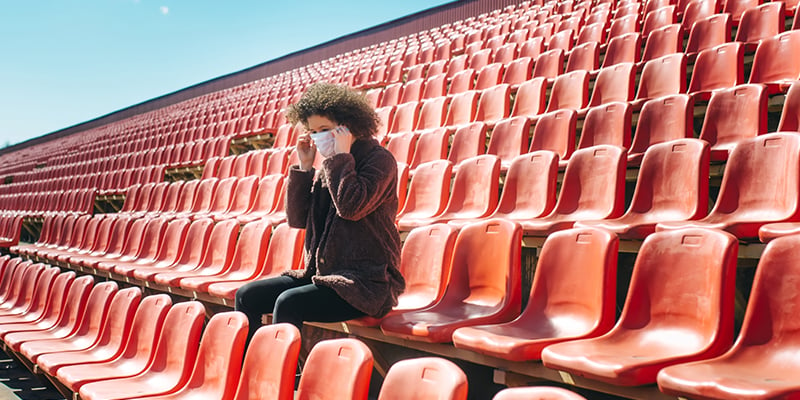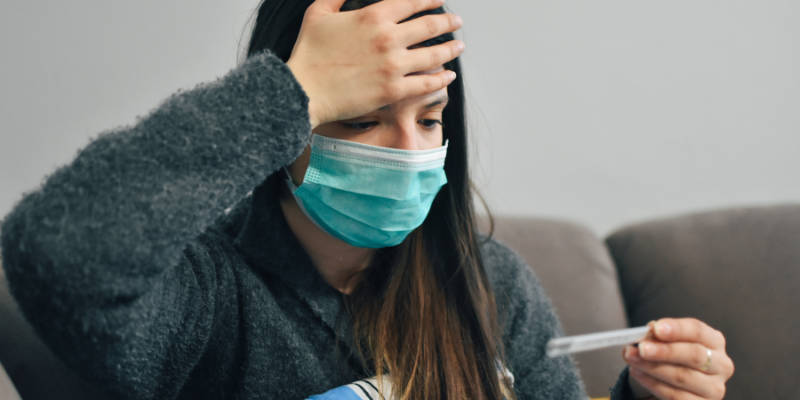
The pandemic has brought so many losses to so many people. For some, it’s the absence of sports that’s the hardest to cope with. And for student athletes who have seen their school sports axed, it’s taking a devastating toll on their mental well-being and cognitive function.
Over two-thirds of high school student athletes say they are experiencing feelings of depression and anxiety since sports were canceled due to the pandemic, according to a nationwide survey. The researchers from the University of Wisconsin School of Medicine and Public Health found that 68% of students surveyed reported mood and anxiety issues at levels typically indicating a need for medical intervention. That’s 37% higher than previous levels.
Athletes at the college level are feeling the pain too. A majority of student-athletes reported high rates of mental distress in the NCAA Student-Athlete COVID-19 Well-being Study, which surveyed over 37,000 participants. Over 25% of the athletes who responded reported feeling a sense of sadness and loss while 1 in 10 said their depression levels were so high it made it difficult to function “most every day” or “constantly.”
For student athletes with ADD/ADHD, the lack of school sports is leading to increased struggles with symptoms associated with the condition.
At Amen Clinics, a global leader in the use of brain imaging in psychiatry, the number of student athletes (and their parents) seeking help for depression, anxiety, ADD/ADHD, and other issues is on the rise.
HOW THE LOSS OF SPORTS AFFECTS MENTAL HEALTH
Missing out on organized sports negatively impacts an athlete’s life in many ways.
Depletes neurotransmitters:
Exercise increases the feel-good neurotransmitters serotonin and dopamine in the brain. Multiple studies show that physical exercise has strong antidepressant and antianxiety effects, with some reports showing it can be as effective as antidepressant medication. The UW study found that physical activity levels among high school student-athletes were 50% lower than pre-pandemic. Without that jolt of neurotransmitter production thanks to exercise, there’s an increased risk of feelings of anxiety and depression.
Reduces focus and attention:
Exercise boosts blood flow to the brain, which can heighten focus and attention in people with ADD/ADHD. In the thousands of ADD/ADHD patients treated at Amen Clinics, there is a direct correlation between the level of exercise a person gets and the severity of their symptoms. When Amen Clinics patients who play sports, such as basketball which involves intense aerobic activity, they do better in their classwork at school. Decreasing activity or adopting a sedentary lifestyle makes people more prone to symptoms of ADD/ADHD, including trouble with focus, inattention, impulsivity, disorganization, difficulty with follow-through, and lack of motivation. That lack of motivation creates a downward spiral—less drive to exercise, fewer benefits from physical activity, even less motivation—that makes it even harder to get off the couch.
Social isolation:
Missing out on the social aspects of team sports lowers moods and can cause depression to set in.
Dealing with uncertainty:
Everyone is dealing with a greater sense of uncertainty due to the pandemic. For students who play sports, that feeling may be more acute. Plans for the return of organized sports at the high school and college level are largely up in the air, meaning athletes are trying to prepare for seasons that may or may not take place. Uncertainty can trigger anxiety in anyone.
Feeling cheated:
When you’ve worked toward a goal, such as earning the right to play a sport in college, and it suddenly gets taken away, you can’t help but feel cheated. You may feel a knee-jerk reaction to blame somebody, but that is the number one way to ruin your life. Blame is an ANT (automatic negative thoughts) that can make you feel like a helpless victim, which increases symptoms of depression.
ENHANCING MENTAL WELLNESS AMONG STUDENT ATHLETES
What can student athletes do to boost their psychological and cognitive well-being? These strategies can help keep anxiety and depression at bay and can improve focus and attention.
Stick to an exercise routine.
Even if you can’t play your sport, maintain a training regimen that will keep you in shape and that will fuel your brain for better mental health and cognitive function.
Connect with teammates.
You may not be able to huddle with teammates on the playing field, but you can connect on social media or via Zoom. Encourage team Zoom meetings or create a group page where you can connect, express challenges, and share strategies with each other. Social connection is critical for reducing depression.
Eat foods that boost feel-good neurotransmitters.
Foods that increase dopamine and serotonin include proteins (such as turkey, salmon, and eggs), probiotic foods (such as sauerkraut, kimchee, and kefir), and nuts and seeds. Most people with ADD/ADHD (except people with Overfocused ADD/ADHD) do better with a diet that is higher in protein and lower in carbohydrates.
Challenge your thoughts.
If your mind is filled with blaming ANTs, learn to talk back to them and start taking responsibility for your life. Stop dwelling on the things that are out of your control and focus on what you can do to make your life better.
Seek help if you need it.
If symptoms of depression, anxiety, or ADD/ADHD become overwhelming or get in the way of day-to-day life, it’s time to seek professional help. Understand that brain SPECT imaging studies at Amen Clinics show that each of these conditions has multiple types, so giving everyone the same treatment plan will never work. Each type requires a personalized treatment plan. Finding out which type you have is the key to getting the most effective treatment.
Anxiety, depression, ADD/ADHD, and other mental health issues can’t wait. During these uncertain times, your mental well-being is more important than ever and waiting until life gets back to “normal” is likely to make your symptoms worsen over time.
At Amen Clinics, we’re here for you. We offer in-clinic brain scanning and appointments, as well as mental telehealth, remote clinical evaluations, and video therapy for adults, children, and couples. Find out more by speaking to a specialist today at 888-288-9834. If all our specialists are busy helping others, you can also schedule a time to talk.





So true! My grandson has played soccer sibce aged 5. 2019-2020 was his senior year and he was captain of his high soccer team and looking for college scholarship opportunities. Of course, the entire season was cancelled. He’s sad and so disappointed. We all feel we missed out as a whole family.
Comment by Jerilyn — August 18, 2020 @ 4:27 PM
During this downtime, I encourage my clients to use this time to work on other parts of their game that they might have never worked on before: 1)Breathwork; 2) Mental Rehearsal; 3) Mindfulness Training; 4) Neurofeedback and Biofeedback training, and 5) Cognitive-Perceptual Training. You might also do work such as Yoga, Pilates/Garuda, and other types of physical training (bodyweight workouts) that you have never tried before. This not only keeps your focus but also develops other key components of your game that will get you prepared and have you come back even stronger when play resumes.
Comment by john stevenson — August 19, 2020 @ 7:34 PM